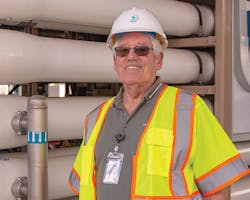JOHN MORRIS CONSIDERS water the “family business.” His family goes back five generations—some 135 years—working in the California water industry. “At the time of my birth, my granddad was national president of the American Water Works Association,” he says. “My first summer internship was as a laborer with the Pasadena Water Department, which my grandfather founded.” Both of his sons are in water/wastewater consulting. Morris’ sole proprietorship company, Water Resources Consultants, provides consulting on water resources, wastewater, desalination, and water reuse for public agencies and other consultants globally.
Morris specializes in desalination, water reuse, master planning, alternative resource evaluations, rate evaluations, and independent design review. He also does sub-consulting for larger consulting firms needing his expertise in the evaluation of alternative water resources, such as water recycling, desalination, and brackish and seawater desalting. Morris consults primarily in the western US but also does consulting for the investment community on water resource program and project opportunities domestically and worldwide.
For three decades, Morris has served on the board of directors for the Metropolitan Water District of Southern California, assisting in the development of water policy for half of California’s population. Morris has amassed knowledge through prior experience with large consulting firms, domestic and international water and wastewater projects, and by serving on committees for the Water Environment Federation (WEF) and AWWA. He’s also expanded his knowledge base through various projects not only in consulting work, but in public agencies.
“My time as director of engineering and planning for the Irvine Water District gave me opportunities to work on expanding the envelope for beneficial use of recycled wastewater,” he says. Morris says the most critical issue facing the water industry is “getting the regulatory framework established where there is a comfort level with the public health services people in particular regarding different uses of recycled water, particularly the potable water reuse classifications,” he says. “I’m glad to see California has separated potable into four different categories—direct potable water reuse, treated water augmentation, raw water augmentation, groundwater augmentation—so it’s clearer to the public as to what you’re intending to do with the recycled water. It makes it easier to establish treatment protocols.”
What He Does Day to Day
“I spend more time on the policy side than anything else. That’s the most personally rewarding time,” he says, adding that six days each month, he attends committee meetings on behalf of the Metropolitan Water District and another meeting representing his city of San Marino and has involvement in the Water Reuse, WEF, and the AWWA—organizations in which he has served in leadership positions. He also spends time reading technical journals.
What Led Him to This Line of Work
“I cannot consciously remember ever thinking about doing anything but being a civil engineer working in water,” notes Morris, who earned a B.S.C.E. in civil and environmental engineering from the University of Southern California. “That’s in admiration of my grandfather, who had very large footsteps in the industry.”
What He Likes Best About His Work
“To know I’ve had the opportunity to improve the quality of life for hundreds of millions of people on this planet,” offers the greatest sense of satisfaction, says Morris. “The Metropolitan Water District is the largest water utility in the country and by some metrics, the world. We supply water to 19 million people. My grandfather helped in the creation of this district back in the 1920s. My dad served on the board with me. It’s my love and my respect for my family that helps me continue a legacy of providing the benefits of reliable, healthy, clean water supply to southern California.”
His Greatest Challenge
Getting elected officials “to understand what it is we’re trying to achieve for the benefit of the public” is his greatest challenge, says Morris. “We’re not anti-environmental—we’re pro serving the public. Our objectives or projects sometimes can be sabotaged by an ill-informed decision by a political body that says, ‘No, you’re not going to do that.’ That’s a challenge for all of us in the utility business. It’s getting a balance in how they understand what it takes to serve the end needs of the public.”
